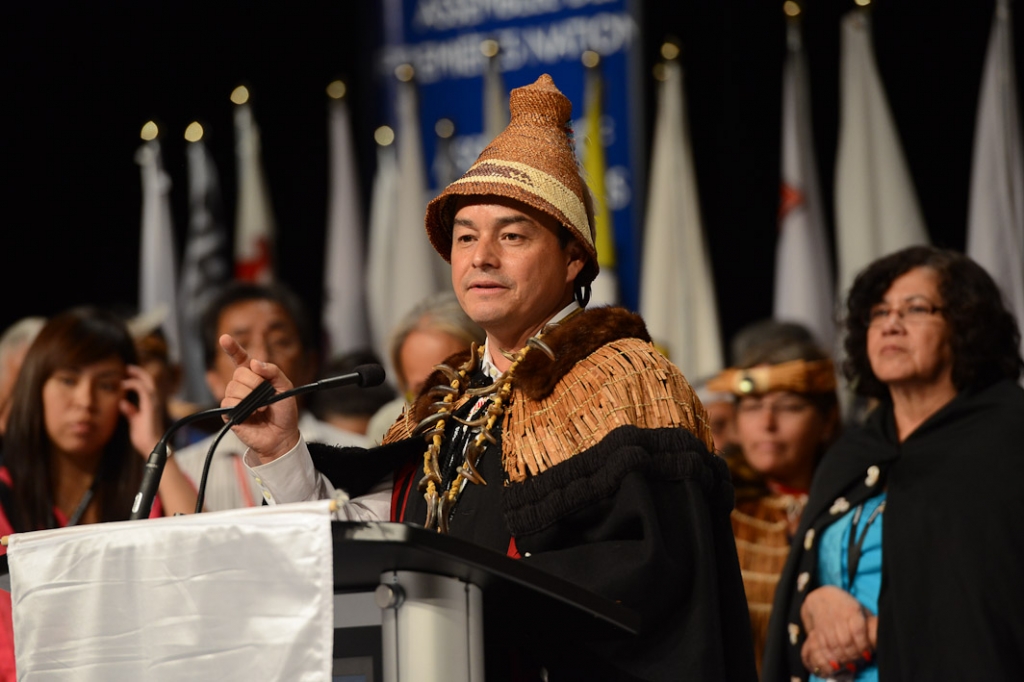Shawn Atleo earned his second term as the head of the Assembly of First Nations (AFN), with a resounding victory during the July 18 election.
Atleo won on the third ballot, finishing with 341 votes out of 512 votes cast.
Pam Palmater, a Mi’kmaq from New Brunswick, finished second with 141 votes. Bill Erasmus, a Dene from the Northwest Territories, ended up third with 30 votes on the final ballot.
Atleo’s victory is being touted as a sign that chiefs across the country want to work with the federal government rather than directly opposed to it.
Atleo was criticized during the campaign for being reticent to confront the government. Those criticisms appear to have held little traction during the election.
Atleo was well ahead of his competitors after the first ballot, when he received 584 votes out of 540 cast. He narrowly missed winning the required 60 per cent on the second ballot.
Excerpt from Shawn Atleo’s victory speech in Toronto
It’s hard not to think of those that have gone before us, as you wake up every day driven to respond to the question about why it is that we do this work that we feel so strongly about.
It’s because of those instructions that were passed down, generation after generation. There was a suggestion that these lands were empty, that there weren’t people here. Far from it. Even here, in 2012, look around this room. Nations from coast to coast to coast are still standing strong. Still working hard to give effect to the visions, to the ceremonies, passed down from the leaders of our nations.
I think about some of the suffering that our people have gone through. The tragedy of the residential school era. I have relatives standing here with me, who are amongst those, just like in your families, who bore the brunt of the worst part of our history. And as a young man at a moment like this, I can’t help but express my appreciation and my honour for your resilience, for demonstrating the power of the ancestry we collectively come from in our respective nations. We are indeed a powerful people.
Your selves as leaders, as chiefs and councilors, we all share in the experience of learning how to serve, and remembering that we serve at the good will of the people. And it is them we must look to for strength and direction. We were asked here to speak directly to our people. And I want to do that. As the very best of our teachings say, all voices must be heard, must be included. That is a part of it, but it is equally important that all voices are understood. Everyone of our citizens has a right and responsibility to share in this effort with us.
Like my late grandmother said, ‘grandson, we are just beginning to be seen.’ Now the voice of our young people suggests that we are beginning to be heard. That the treaty partner is beginning to feel the effects of that sacred ceremony, so powerfully done that is still being repeated by our people in all of our respective territories.
Right up into next week, coming up at the Council of Federation, we take our message of action on our rights to every level of government and every citizen of this country that we will stand together, that we are stronger together. We reflect back to every one of our citizens who’s facing turmoil in their lives, whether in the cities or in the northern remote communities, that we as leaders are going to stand together with them. That’s what the ancestors had envisioned when they came in the 1940s and stood together, before the Assembly of First Nations was even formed. Who would think that over 50 language groups covering every inch of the territories that we share, could find a way to come together?
I believe that this is our moment. We are part of a movement not only in this country we call Canada, but of Indigenous people around the world who coalesced around the efforts of the United Nations declaration on the rights of Indigenous peoples, and we will take our rightful place in our respective territories.
We go ahead armed, knowing that we’ve got the young people that are beginning to hear and understand and take the messages to the hearts and homes of our parents. We go forward armed with knowledge that corporate Canada has joined our call to action. Corporate Canada is saying that the federal government has to rekon with and respect Treaty Rights, title rights and that First Nations must be full partners in addressing the issues of resource development in this country. It is far over due.
Gold has arrived.










Gold has arrived. Here in the north of Ontario we see vast streams of gold shimmering across the landscape as autumn is here and the the leaves are turning...
I am the product, evolution of many thousands of years as are you. I grew up on the land in the remote far north of Ontario following in the footsteps of my...